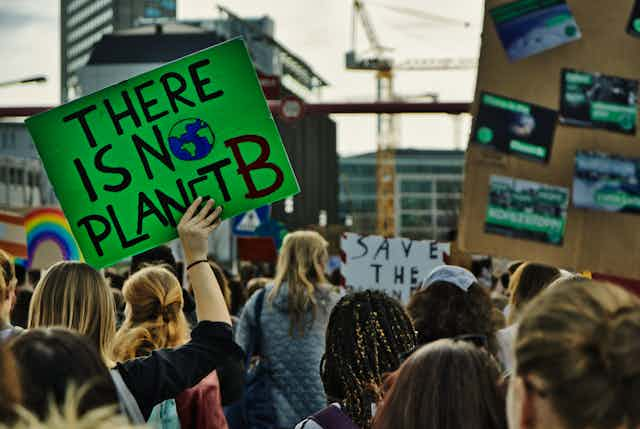I initiated a letter of support to climate striking students – an English version of the German letter coordinated by ecologist Gregor Hagerdorn, signed by more than 1,000 academics – for many reasons.
My role as a university lecturer means that I am committed to fostering better lives and opportunities for each generation. I am also a parent, so when I hear the request from youth, including my students and child to stand with them, I am naturally inclined to give their case fair consideration.
But I am a scientific researcher, too. The first, core demand of the striking students, led by 16-year-old Swedish climate activist Greta Thunberg, is to “unite behind the science”. How could I not recognise the significance of this demand in a communication landscape too often dominated by short-term sensationalism, rather than the core challenges facing society and the living planet?
But there’s a deeper, more fundamental reason to support the global strike for climate, grounded in my own field of political and ecological economics.
My research focuses on how, if at all, we can create an economy that is focused on achieving human well-being and avoiding damage to the environment. The current prospect is not good. No country yet meets most needs of citizens at a sustainable level of resource use.
But my research also shows that it may be possible to do this and more. We have the capability to meet basic needs and achieve high levels of human well-being at modest levels of energy use. And beyond this moderate amount, there is no reliable relationship between energy use and well-being. In many cases, added energy can even harm human health and well-being through air pollution, climate impacts, road accidents, and lack of exercise.
A rapid, radical reduction in energy demand could perhaps fulfil both goals of addressing climate breakdown and enabling our students and children to live good lives: what Kate Raworth calls living within the “doughnut”. So why is this option not debated and put forward through an ambitious policy agenda?
A different future
The answer is both simple and profound. My research area remains marginal, and its results neglected, because to accept it would require a fundamental transformation of the prevailing economic philosophy. We would need to pay less attention to growth and profit as the measures of prosperity, and replace them with sufficiency and equity – a fair division of resources to provide what is sufficient for well-being and not more. After centuries of entrenchment, that’s no easy feat.
But neoclassical economics itself is not the main culprit in our planetary predicament. When we look deeper, and seek to understand the factors underpinning the rise in consumption culture that drives our energy use, we are confronted with a problem of the way production relates to politics.
Read more: Surviving climate change means transforming both economics and design
The production, pricing, and consumption of goods and services are not simply driven by the natural balancing of supply and demand. The economy is best understood as a social and political arena. In this arena, highly productive industries invest heavily in advertising to artificially grow consumption. As my upcoming research shows, they coalesce in aligned mega-sectors, such as the automotive, road-building and real estate industries, all of which wield outsize political influence, and have a vested interest in trapping consumers in car-intensive, road-intensive, suburban housing.
The paradox of high resource use that results in little or no human benefits has its roots in the very structure of our political economy, and the industries that are some of its most important mainstays. Transforming this structure means challenging these sectors, and finding ways to counter their excessive influence in our democracies.
This is why we must support the students’ strike this Friday, and every Friday for the foreseeable future. Significant change will not come into being without protests and solidarity movements that rigorously question unacceptable modes of living and politics. It is time for all of us to wake politicians, businesses, and institutions up to the immense task of transforming our societies.

This article is part of The Covering Climate Now series
This is a concerted effort among news organisations to put the climate crisis at the forefront of our coverage. This article is published under a Creative Commons license and can be reproduced for free – just hit the “Republish this article” button on the page to copy the full HTML coding. The Conversation also runs Imagine, a newsletter in which academics explore how the world can rise to the challenge of climate change. Sign up here.

